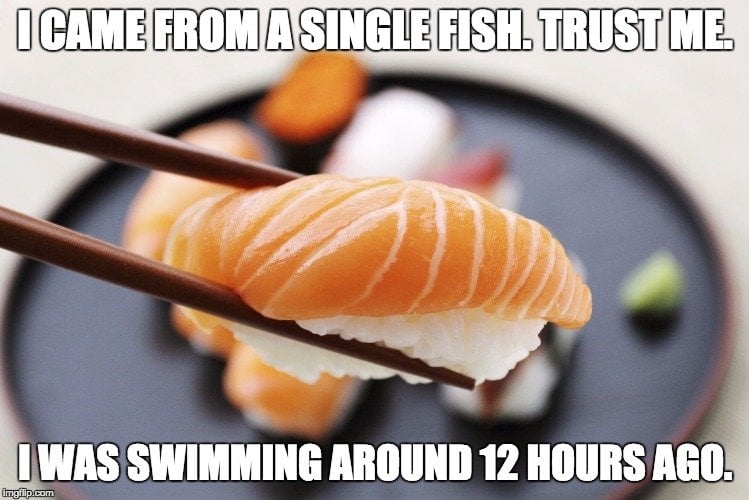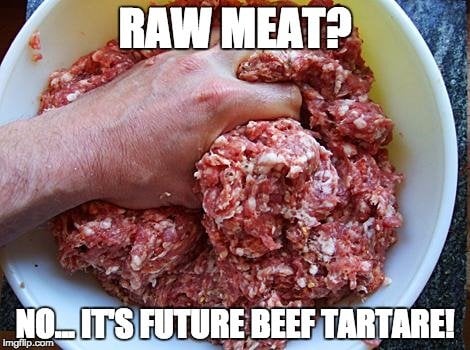Table of Contents (click to expand)
If a meat has a lot of pathogens that can infect humans, it’s probably not safe to eat that meat raw.
Imagine you are in your favorite sushi bar. The tea has been poured, the seaweed salad has been eaten, and you are eagerly awaiting your sushi platter. When it finally arrives, you see pink fat marbled salmon sitting atop the perfectly shaped rice, and your mouth begins to water.
So why is it okay to eat raw fish (and even beef) but not raw chicken or pork? Many even shy away from raw eggs.
Short answer: Raw meat from certain animals, such as fish, contains fewer pathogens—bacteria, viruses, and parasites—that infect humans. Eating raw meat depends on several factors, including preparation, hygiene conditions, the animal species, and where that animal is sourced from.
Recommended Video for you:
Which Meats Can You Eat Raw?
While some people are paranoid about undercooked food, there is actually a range of meat you can eat raw.
Why Is Eating Beef Raw Or Rare Okay?
Steak tartare, a popular dish in some European countries, is raw minced beef or horsemeat flavored with spices and vegetables, topped with a raw egg.
The restaurants serving the dish use only the highest quality beef from a few select butchers.
It is also essential that the meat is fresh and stored in cold conditions.
What about rare steak?
Since the 1990s, industries have developed new techniques to limit the contamination of pathogens in beef. Most pathogen contamination occurs because the hide of the animal is contaminated. This discovery has led to interventions where the hide is cleaned, limiting the meat’s contamination.
Searing the outside kills any bacteria on the surface. So once the outside is cooked, a rare steak is perfectly safe to eat.
But, eating beef raw or cooked rarely comes with a caveat. It is only safe to consume beef this way if it is prepared hygienically. Some red flags to look out for are if the butcher doesn’t sanitize their countertop, doesn’t wash their hands between cutting different types of meat, or prepares the beef on the same surfaces as they cut chicken or pork (two types of meat that you should not eat raw).
Fish
Sashimi and sushi restaurants are popular worldwide; the raw fish is a delicacy.
Not all fish are fit to be eaten as sushi or sashimi. The fish commonly eaten as sushi are expensive marine fish such as tuna, yellow tail, and red snapper. These fish rarely have pathogens that infect humans. And for these fish, there is a process that makes them sushi-grade fish.
To make a fish sushi grade, it is bled thoroughly and gutted soon after it is caught. After this, the fish is iced, and fish such as salmon are flash frozen. Freezing the fish kills any pathogens that may be present.

One study found that industrially prepared sushi fish had more instances of bacterial pathogens than fresh fish. According to a study, the number of cases of infection from pathogens in sushi fish (consumed in Japan), such as tapeworm or herring worms, is low.
Finally, the fish you buy is usually not minced, which is common with beef, chicken, and pork. This means that an infected fish cannot infect other fish.
But, if you are worried, use your nose. Smell the fish you’re about to it. If it smells offensive, don’t eat it.
Which Meats Can’t Be Eaten Raw And Why?
Beef
Beef is on this list. Raw beef is a delicacy and, like all delicacies, is rare and expensive. Cuts of beef that most of us can afford can be infected with a few problematic pathogens.
One such pathogen is beef tapeworm, which causes almost 50 million cases worldwide each year. It is caused by eating raw or undercooked meat. Bacteria such as salmonella, listeria, and Shiga-toxin-producing E. coli may also exist. But, the spread of these bacteria can be limited if the beef is processed properly.
Another is Toxoplasma gondii. This parasite spreads through cat feces into other animal’s muscles, where it lies dormant, waiting to end up in a cat to complete its life cycle. Toxo does infect many mammals, including us.

Pork
Raw pork isn’t something you hear about too often, but that’s more because raw pork doesn’t taste as great as cooked pork.
But pork has its share of the pathogen. Trichinosis, a parasitic infection of the tissue, as well as worm cysts, infects pigs. Pigs who grow up in pens and don’t have access to a normal omnivorous diet pose a high risk of contracting pathogens that can infect humans. This is concerning since pork is one of the most widely consumed meats in the world.
Chicken
The thought of raw chicken turns people’s stomachs, conjuring up the word Salmonella and the violent gut troubles Salmonella can cause.
Chickens tend to harbor a large amount of Salmonella and E. coli, particularly when kept caged without access to their normal diet. However, some believe that properly pastured, healthy chickens can be eaten raw, but even so, few people forego a perfectly cooked piece of chicken for a slippery raw breast.
How Do You Know Meat Is Safe To Eat Raw?
There is no black-and-white answer to this question.
There are several factors to consider, such as how the meat is prepared, where it comes from, and under what conditions the animal was raised.
Even when it comes to sushi, fish that has been defrosted and refrozen isn’t the best option. Sushi tastes best and is safest to eat when the fish is fresh or at least not more than 2-3 days old. Don’t worry… there are many delicious and reputable sushi spots out there.
With beef, look for a butcher you can trust to give you quality beef.
Since the 1990s, we’ve developed new techniques to limit the contamination of pathogens in beef. Most pathogen contamination occurs because the hide of the animal is contaminated. This discovery has led to interventions where the hide is cleaned. A good butcher will be able to source the best quality.
In short, you can potentially trust raw meat from farms and distributors that employ humane and sustainable methods of raising their animals, but remember, there is always a certain amount of risk with raw meat, so choose wisely!
References (click to expand)
- Northrop-Clewes, C. A., & Shaw, C. (2000, January 1). Parasites. British Medical Bulletin. Oxford University Press (OUP).
- Roberts, T. (1985, December). Microbial Pathogens in Raw Pork, Chicken, and Beef: Benefit Estimates for Control Using Irradiation. American Journal of Agricultural Economics. Wiley.
- You Asked: Why Can't I Eat Raw Meat?.
- Nawa, Y., Hatz, C., & Blum, J. (2005, November 1). Sushi Delights and Parasites: The Risk of Fishborne and Foodborne Parasitic Zoonoses in Asia. Clinical Infectious Diseases. Oxford University Press (OUP).
- Djurković-Djaković, O., Bobić, B., Nikolić, A., Klun, I., & Dupouy-Camet, J. (2013, July). Pork as a source of human parasitic infection. Clinical Microbiology and Infection. Elsevier BV.
- Li, Y., Carrillo, J. A., Ding, Y., He, Y., Zhao, C., Liu, J., … Song, J. (2015, September 14). Transcriptomic Profiling of Spleen in Grass-Fed and Grain-Fed Angus Cattle. (S. D. Fugmann, Ed.), Plos One. Public Library of Science (PLoS).
- Power, A. G., & Mitchell, C. E. (2004, November). Pathogen Spillover in Disease Epidemics. The American Naturalist. University of Chicago Press.
- i The Chicken or the Egg? Hen Health and Food Safety on ....













